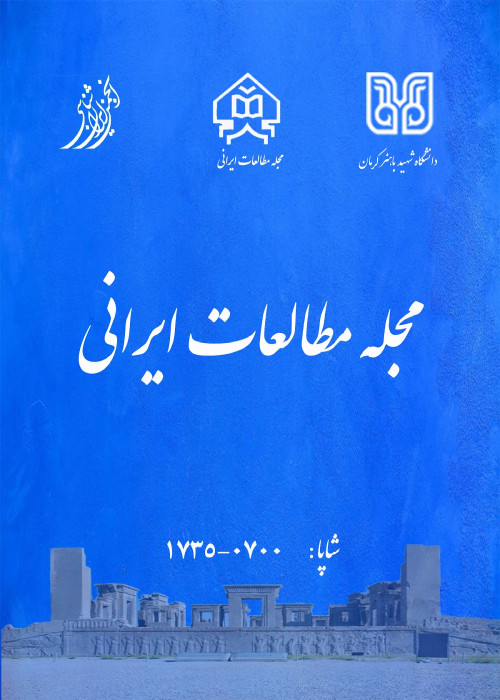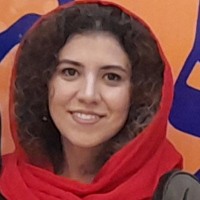Women's historiography in bastani Parizi’s works
Mohammad Ibrahim Bastani Parizi, the son of Haj Akhund Parizi, was born on the 3rd of Day 1304 SH.. He completed his education in Tehran. He received his Phd. degree by translating Ibn Athir's pre-Islamic section as a doctoral dissertation (Bastani Parizi, 1366, 4). Bastani’s period of life began in earlier years of the first Pahlavi and continued until the fall of Pahlavi and the years after the Islamic Revolution. Certainly, the profound political, social and cultural events that took place in Iranian society during these years have greatly influenced his typeand style of writing . Finally, he died on Tuesday, 5th of Farvardin, 1393, at the age of 89. At the age of 20, he wrote his first book, The Prophet of Thieves, which has been reprinted 17 times. He has written about 1000 articles and his collection of books has reached 63 so far, 13 of which are in Kerman.
The present research is in the line of theoretical researches and is from the branch of historical researches which has been done by using the library method and taking notes of Writings and books bastani parizi and some contemporary historical texts. Assuming that Parizi pays attention to women as an influential element in historical events and has portrayed the image of them in social life as a free and independent human being with a special status in his works; so in this research we are faced with this main question that how is the position of women in Parizi’s works? In answer to this question, the main hypothesis is that Bastani Parizi has had a positive view of women in the history of Iran, contrary to the usual practice. The purpose of this article is to examine the status of women's historiography in Parizi works. The importance and necessity of addressing this issue is the lack of historiography about women as a new matter in historiography. Historical research in the field of social life, especially that of women, is one of the most overlooked topics of historical studies in Iran. Lack of attention to this issue in historiography is one of the difficulties that make researchers doubt to enter this field. Of course, some efforts have been made, but they are not enough, e.g.: Ms. Simin Fassihi's article, entitled "From the History of Elite Men to the History of the Forgotten Women: Causes of Delay in the Emergence of Women's Historiography" in which the reasons for the general neglect of historiographical schools (political, cultural, social) on the subject of women on the one hand and women's awareness of their rights and on the other The focus of these rights on the emergence of feminist movements has been addressed. Ms. Rostami's article entitled "Woman-centered reading in the history of Beyhaqi and Samak Ayar". She deals with the social discourse in these historical works in which women have grown up, shone or been suppressed. Also an article entitled "Women's image in the history of Jahangosha Jovini" by Mohammad Alipour, which surveys the position and image of women in this book, the role of women in the political and cultural issues of the time and how women reached social status and civil rights. Of course, Reza Baraheni wrote "Male History" in 1348 SH. he emphasized that "weakening the female sex is a made up by patriarchy" (Baraheni, 1982, 172). Although the work was written half a century ago, it is still necessary to express the overlooking history of women's in women's researches. Therefore, in this study, By examining the works of Parizi as a historian with historiography in a special way, which has paid more attention to this topic, than other contemporary historians, an attempt has been made to study and reflect the role of women in his works. Bastani Parizi has considered the social life of women in both cultural and family activities. The role of women in many political events from Parizi’s perspective is considered as the footprint of women in history. The economic position of women with land ownership and economic endowments has attracted Parizi’s attention.
The identity of each nation is made up of a set of specific and functional realities, which have been formed throughout the history of each nation. Among the most prominent elements of identity: common language and geography, religion and beliefs, etc., are among the items that are considered in historiography, and when historiography pays attention to a certain group, these identity factors show themselves more. (Sabzianpour, 2016, 77) Women's historiography is a special method in historiography in which the Parizi has distinguished himself from other historians of all times by including female gender in history analysis. Women's historiography in Iran is more limited to exploring documents, memoirs, women's notes and descriptions of their activities in history, and less to the methods and criteria of women's historiography and the use of gender in the analysis of women's history (Fassihi, 2009, 45). Bastani Parizi has written and analyzed historical events with a different perspective on the influence of women in history.The writing of Parizi's first article entitled "It is the fault of men, not women" in Tir 1321, which was published in Kerman Awakening newspaper, coincided with the change of conditions and the promotion of women to leave the traditional life that had begun since the beginning of the first Pahlavi period. And it continued until the second Pahlavi period. One of the slogans of that period was this change of attitude towards women. Although the works that emerged in this field show authors concern of women and its issues, express the real view of the authority towards women . However, this movement was formed only to gain prestige in the world community and to move towards modernism and modernization, and to gain legitimacy in accordance with the requirements of the times. It must be acknowledged, of course, that the role of women in Parizi’s works was written concerned to the deprivations, restrictions, and realization of women's rights and demands, something that was rare in the works of the time. Girl's castles are among the buildings that are usually built in impassable areas and no one is sure about their construction and secrets. Bastani Parizi in the book of Khatoon Haft Qala pays special attention to these castles, including Dokhtar Castle in Kuhbanan (Modarressi, 2012, 224 and 230)
Women's historiography is a special method of historiography in which Parizi, by entering female gender topic in the analysis of history, have distinguished his historiography from women historians close to but different from other contemporary historians. What can be deduced from the position of women in Parizi’s works is that the good and positive image of women is superior to its negative. Due to, women are not always and everywhere the same, and Parizi is not expected to hide anything contrary to what is in the nature of a person or society, In general the writer believes that: first, although compared to other historians of his time Parizi in his historiography has shown more attention to women, the status of women has not been considered as much as their service and position and importance in society. Secondly, his attention is the result of the conditions of the time, his spiritual and educational condition, the conditions of his private life and what had happened to his relationship with women, as well as what he had learned from it has given him a total perception the same as what can be clearly seen in his works.The presence of women in social position, such as participation in charity affairs, based on endowment is emphasized. In addition to the role of women in the society their cultural roles are also been surveyed. Bastani Parizi in many political events has sought the role of women as behind-the-scenes and also motivating factors of men in their important political decisions. Women are considered as uncrowned kings in his works. He also had studied and analyzed the presence of women alongside men in military incidents and wars.
- حق عضویت دریافتی صرف حمایت از نشریات عضو و نگهداری، تکمیل و توسعه مگیران میشود.
- پرداخت حق اشتراک و دانلود مقالات اجازه بازنشر آن در سایر رسانههای چاپی و دیجیتال را به کاربر نمیدهد.



